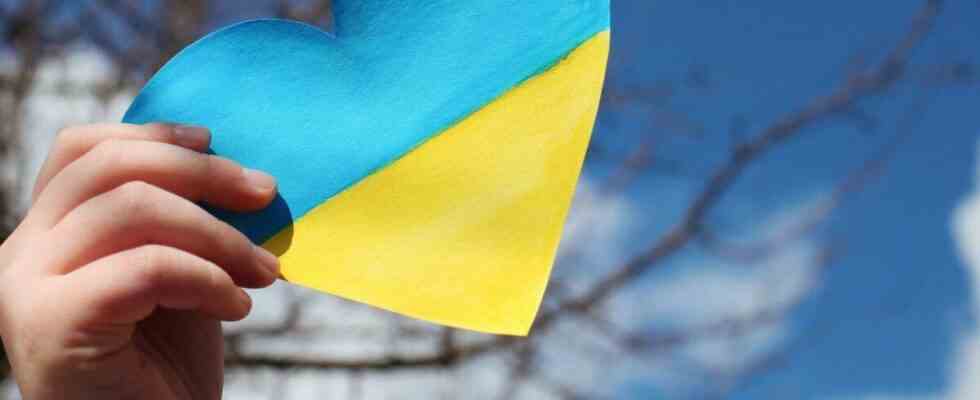This Friday evening, they will be on vacation like all the other students in France. But the Ukrainian pupils will not welcome them with the same enthusiasm as their French comrades. Few will be those who will leave, and for those who will have this chance, it is difficult to give way to carelessness when his country is at war.
Be that as it may, they can congratulate themselves on the course they have already accomplished in our country. Because since February 24, 2022, 18,832 Ukrainian students have arrived in French establishments: 19% in kindergarten, 39% in elementary, 32% in college and 10% in high school, according to ministry data collected by 20 minutes. It is in the academies of Nice, Versailles, Grenoble, Normandy, Strasbourg and Lyon that the number of children received is the highest. Impossible to make a uniform picture of their last months in France, “because there is a great variability of situations. We are more in the tailor-made than in the single menu ”, notes Remy Sirvent, national secretary of SE Unsa.
Different schooling conditions, from one city to another
Some Ukrainian pupils are enrolled in an educational unit for incoming allophone pupils (UPE2A). A device that allows you to be attached to an ordinary class to follow all the subjects, while benefiting from reinforced teaching in French. Unfortunately, not everyone benefits from this: “UPE2As are more often concentrated in large cities. However, the children are welcomed where there are accommodation places, therefore generally in small towns which do not have them, ”observes the trade unionist. “In this case, the children are in total immersion in normal classes held by teachers who generally do not have a common language with them”, relates Guislaine David, pspokesperson for the SNUipp-FSU (first degree union).
For secondary school, the luckiest students had a place in UPE2A. “And the middle and high school students who were studying French in LV2 in Ukraine were placed full-time in normal classes, hoping that they would manage. With classes that are sometimes already at 35 students, the learning conditions have not been ideal,” reports Sophie Venetitay.ssecretary of the SNES-FSU.
To overcome the language barrier, teachers resorted to resourcefulness and used the translator on their phones, even if a few municipalities have hired translators to lend a hand to teachers. Not easy for them to adapt their pedagogy to these students who did not have the same school system. The Casnav (Academic Centers for the education of newly arrived allophone pupils) of the rectorates have made online teaching tools available to them. The goal: to give advice on caring for these children who have experienced the trauma of war and exile, but also to find their way around the Ukrainian education system, know the school vocabulary in the language, build sequences… Of course, some subjects are easier to teach than others to non-native speaking children: “Teachers can easily pass on knowledge of maths, digital language and sport to them,” observes Remy Sirvent.
“The younger they are, the faster they progress in a foreign language”
In addition to the teaching hours of French schooling, some students were able to benefit from continuity of learning in their mother tongue. Ukrainian language and culture courses, coordinated by the Cned, were given by Ukrainian teachers recruited by the academies. And some teachers who stayed in Ukraine continued to teach remotely. In order to facilitate the integration of pupils, a tutoring system for pupils has often been put in place.
Admittedly, the start was not always easy, as Remy Sirvent points out: “It was not easy to put the children most disturbed by the war in a learning situation”. But after a few months, many have found their feet. Those who did not know a word of French progressed well, observes Guislaine David: “The younger they are, the faster they progress in a foreign language”. And even if they have fallen behind in relation to Ukrainian educational programs, this is not the most important, according to Remy Sirvent: “The main thing is that they are in a teaching situation. »
A return to multiple challenges
A positive sign: some are going to or have even passed the ZNO, the Ukrainian upper secondary school leaving certificate, the equivalent of the baccalaureate. “As of June 7, 823 candidates have confirmed their participation in the license entry test, i.e. nearly half of the students enrolled in high school in France to date. These tests will be organized in the academies of Paris, Bordeaux and Marseille”, informs the ministry.
And the next school year? It will be a new challenge. Because if some will try to return to Ukraine, a large part will not be able to. “The war is likely to last, so the students will approach this start of the school year with the idea that they will stay in France”, underlines Remy Sirvent. Teachers also know that there will be new students who will set foot on French soil. “We must plan for the opening of places in UPE2A and recruit more teachers in FLE (French as a foreign language)”, insists Guislaine David. “We also need more school psychologists to support these students, who are faced with the disappearance of some of their loved ones and the fact that their life in France will last,” adds Sophie Venetitay.

